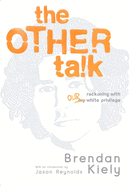
In 2015's All American Boys, Brendan Kiely and Jason Reynolds wrote about a fictional act of police brutality. One of the affecting aspects of that YA novel is the necessity of the Black teen's father to give him "the talk": a conversation many Black parents have with their children about how to act around police. Now Kiely (Tradition) turns to nonfiction to address race, specifically privilege, in his version of the talk for white people. Kiely pulls no punches and exposes his own flaws in this extraordinarily powerful, straightforward discussion aimed at white teenagers.
Kiely wants his audience to know that "talking about being white, talking about white privilege, isn't anti-white. It's just being honest." He goes on to say, "If I'm honest with myself--about being white--I can learn; I can grow. I can do better." He speaks freely, pointing out where privilege hides in plain sight. Then he helps readers understand both how they can use their advantages to make a difference and to be an ally, and why doing so is their responsibility. "You and I inherited stupidly unfair amounts of privilege... and if we don't help eradicate racial injustice, we're actually helping maintain it--in fact we could even be helping it get worse." Kiely knows from personal experience that people won't always get it right. He encourages them to be "strong enough to listen when it counts, even if it hurts a little," in order to self-correct and try again.
Identifying racism, acknowledging it and trying to do something about it are encompassed in Kiely's clear, heartfelt, honest talk. There is no doubt this conversation is long overdue. --Jen Forbus, freelancer

